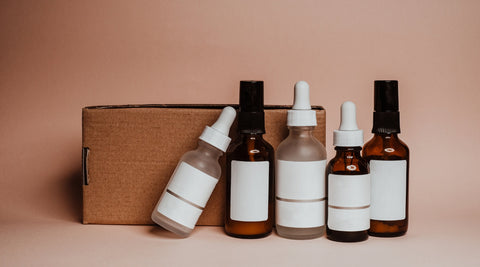Walk into any skincare aisle or scroll your feed and you’ll find a thousand products promising to “reverse,” “erase,” or “anti-age.” As if ageing were a disease. As if laugh lines were something to correct. As if your skin didn’t earn every freckle, fold, and freckle from the life you’ve lived in it.
At The PrimaryRx, we believe in science-backed skin health, not fear-based marketing. So let’s break down what ageing skin really needs, what’s just noise, and why “graceful ageing” isn’t a soft way of saying “do nothing” - it’s a smarter, more sustainable approach to caring for your skin.
First, Let’s Be Clear: Ageing Is Not a Problem to Fix
Your skin is supposed to change over time. Collagen slows. Cell turnover declines. Pigment shifts. This is normal biology, not failure.
But instead of supporting those natural transitions, the beauty industry often frames them as flaws to be fought. The result? We chase “correction” instead of care.
And that endless correction cycle - more peels, more procedures, more products, can leave skin stripped, reactive, and ironically, older-looking.
The Problem With “Anti-Ageing” Messaging
The term itself is loaded.
It sells fear: that looking older is something to panic over.
It sells false promises: that certain serums or supplements can “turn back time.”
It ignores diversity: not all skin ages the same way, and not all signs of ageing are bad.
Worse, it frames ageing as something you failed at - when, really, it’s something you’re lucky to experience.
What “Ageing Gracefully” Actually Means (Hint: It’s Not Giving Up)
Ageing gracefully is not about doing nothing. It’s about doing what works and skipping what doesn’t. It’s about choosing science over gimmicks, support over suppression, and resilience over obsession.
Graceful ageing means:
- Strengthening your skin barrier, not stripping it
- Feeding your skin the nutrients it needs to repair itself
- Protecting against preventable damage (UV, pollution, chronic inflammation)
- Accepting change while still supporting function, tone, and texture
It’s less about erasing and more about preserving the integrity of your skin.
What Science Supports
1. Daily Sun Protection
Nothing accelerates ageing like UV. Daily SPF is more powerful than any collagen cream.
2. Antioxidants (Inside & Out)
Free radical damage doesn’t just cause wrinkles - it leads to uneven tone, sagging, and dullness. Antioxidants can help reduce that burden and keep skin cells functioning optimally.
3. Skin Barrier Support
Ageing skin = thinner, drier, more sensitive. Barrier-strengthening ingredients like ceramides, niacinamide, and omega-3s help retain moisture and prevent irritation.
4. Internal Anti-Inflammatories
Chronic low-grade inflammation (aka inflammaging) accelerates collagen breakdown. Nutrients like your omegas help regulate that process at the cellular level.
5. Stimulating, Not Stripping
Ingredients like retinoids and peptides help support collagen, but overuse can backfire. Ageing skin benefits from gentle stimulation - not a constant chemical attack.
Signs You’re Falling for a Gimmick
- Claims that promise to “reverse” or “cure” ageing
- Products with 20+ ingredients but no clinical testing
- Photoshopped “before and after” shots that erase pores, texture, and reality
- Words like “patented ingredients” are sometimes just a way to keep you from knowing what’s really in the bottle
- Buzzwords like “DNA reset” or “youth molecule” without substance behind them
If the marketing sounds like science fiction, it probably is.
The Bottom Line
Ageing isn’t a flaw. It’s a process. A smart skincare routine doesn’t aim to freeze your face in time - but to support your skin as it evolves. The goal isn’t to look 25 forever. The goal is to look well, at any age.
So if you’re done with the noise, we’re with you.
Let’s age with intention, not insecurity. With science, not snake oil. With skin that looks lived in - not lab-altered.
References
- Farage MA, Miller KW, Elsner P, Maibach HI. (2013). Intrinsic and extrinsic factors in skin ageing: a review. Int J Cosmet Sci, 35(3), 231–238. https://doi.org/10.1111/ics.12037
- Gilchrest BA. (2013). Skin aging 2003: recent advances and current concepts. Cutis, 72(5 Suppl), 5–10.
- Krutmann J, Schikowski T, Morita A, Berneburg M. (2021). Environmental causes of aging. J Invest Dermatol, 141(4S), 31S–36S. https://doi.org/10.1016/j.jid.2021.01.032
- Calder PC, Bosco N, Bourdet-Sicard R, et al. (2017). Health relevance of the modification of low grade inflammation in ageing (inflammageing) and the role of nutrition. Ageing Res Rev, 40, 95–119. https://doi.org/10.1016/j.arr.2017.09.001
- Fardouly J, Diedrichs PC, Vartanian LR, Halliwell E. (2015). Social comparisons on social media: The impact of Facebook on young women’s body image concerns and mood. Body Image, 13, 38–45. https://doi.org/10.1016/j.bodyim.2014.12.002



